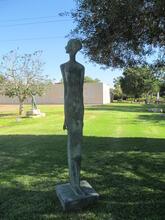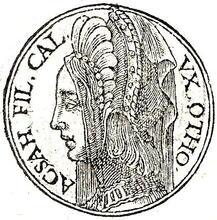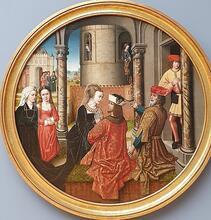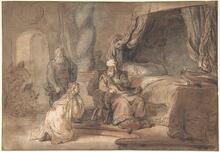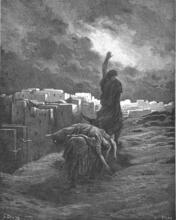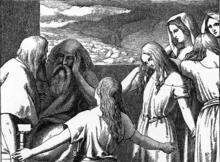Lot's Daughters: Midrash and Aggadah
The midrashic analysis of Lot’s daughters largely focuses on why they become impregnated by Lot, and what the effects of this deed are. In opposition to the biblical portrayal, the Rabbis turn the blame on Lot for this incestuous action. They argue that Lot exhibits selfish and harmful behavior throughout his life; one midrash argues that the daughters’ relations with their father are punishment for his choices, while another says that he secretly desired his daughters. The sympathetic midrashic analysis of the daughters seems to be due to the ancestral connection between the daughters and Ruth.
Biblical Portrayal of the Daughters
According to the Rabbis, Lot had four daughters, two of whom were married, and two betrothed. The two married daughters and their husbands, along with the two future bridegrooms, remained in Sodom and perished, leaving Lot with only two daughters after the destruction of the city (Gen. Rabbah 50:9; Pirkei de-Rabbi Eliezer, ed. Higger chap. 25).
In their depiction of the impregnation of Lot’s daughters by their father, the Rabbis draw a distinction between the father and his daughters. The Biblical story presents the daughters as the initiators and the active perpetrators of this act of incest: they ply their father with wine and lie with him, while their intoxicated father does not know when they lay down with him or when they rose. We would expect the Rabbis to condemn the daughters’ actions and defend Lot, but the opposite is the case. The Rabbis portray the daughters in a favorable light, while Lot is indicted.
Midrashic Perspective of Lot
According to the A type of non-halakhic literary activitiy of the Rabbis for interpreting non-legal material according to special principles of interpretation (hermeneutical rules).Midrash (Tanhuma, Vayera 12), Lot, from the outset, decided to dwell in Sodom because he wanted to engage in the licentious behavior of its inhabitants. His negative behavior comes to the fore when the townspeople mill about his door, demanding that he hand over the angels, and he instead offers his daughters to the mob. The Rabbis observe that a man usually allows himself to be killed in order to save his wife and children, while Lot was willing to allow the townspeople to abuse his daughters. In response to this, the Holy One, blessed be He, says to Lot: By your life, the improper act that you intended to be done to your daughters will indeed be committed, but to you.
This midrash sharply focuses the reversal between these two episodes. In the first event, in Sodom, Lot was ready to force his daughters, against their will, to engage in sexual relations with the townspeople. In contrast, in the second episode, which takes place after the upheaval of Sodom, Lot’s daughters engage in relations with their unwitting father. Consequently, these acts of incest are Lot’s punishment for his unseemly behavior.
Another midrash (Aggadat Bereshit [ed. Buber] 25:1) regards the daughters’ act as punishment for their father’s own sexual promiscuity. Lot thought that if he were to dwell in Sodom, he could engage in licentious behavior without anyone’s knowledge. He accordingly was punished by his daughters engaging in intercourse with him; this episode became common knowledge and is read each year during the public Torah she-bi-khetav: Lit. "the written Torah." The Bible; the Pentateuch; Tanakh (the Pentateuch, Prophets and Hagiographia)Torah reading of the verse: “Thus the two daughters of Lot came to be with child by their father” (Gen. 19:36). R. Nahman adds: “Whoever is driven by his hunger for transgression will eventually be fed from his own flesh” (Tanhuma, Vayera 12). Lot was eager to engage in promiscuity; in the end, his daughters played the harlot with him.
Another Rabbinic view was that Lot secretly lusted after his daughters. He was intoxicated when the elder sister lay with him, but he was sober when she rose, as is indicated in the Torah by the dot over the word u-ve-komah (“when she rose”). Despite his knowledge of what had transpired, he did not refrain from drinking wine the next night as well, and lying with his younger daughter (Gen. Rabbah 51:8–9).
Midrashic Perspective of the Daughters
Lot’s daughters, in contrast, are treated sympathetically. The midrash observes that, by strict law, the daughters deserve to be burnt by fire for having lain with their father (Aggadat Bereshit [ed. Buber] 25:1), but the Holy One, blessed be He, who knows man’s thoughts, judges them by their thoughts and not their deed. The daughters’ true intent was not to lie with their father, on whom they had no sexual designs, but to save the world from total devastation. The daughters thought that the entire world had been laid waste, as had happened during the Flood, since they saw no living souls wherever they went; they did not know that only Sodom had been destroyed. They said: “The Holy One, blessed be He, has rescued us so that the world will exist through us, so that the human race shall continue.” The Holy One, blessed be He, knew their honest minds and good thoughts and rewarded them for their actions. Accordingly, when he commanded “no Ammonite or Moabite shall be admitted into the congregation of the Lord” (Deut. 23:4), this prohibition against intermarriage applies only to the males, and not to the females (Pesikta Rabbati 42).
The underlying reason for the sympathetic treatment of the daughters of Lot apparently stems from Ruth the Moabite’s tracing her lineage to them and the subsequent descent of King David and, eventually, of the Messiah, from Ruth’s marriage to Boaz. According to the midrashic account, when Lot was commanded to rescue his two daughters from the destruction the angels already foresaw that Ruth the Moabite and Na’amah the Ammonite would descend from them (Gen. Rabbah 50:10). In addition, when Scripture tells of the incestuous act by the daughters of Lot, who say: “that we may preserve seed from our father” (Gen. 19:34), it uses the word zera (“seed,” or “offspring” in a more general sense), and not “son,” since the intent of the Holy One, blessed be He, was related to the Messiah (Gen. Rabbah 51:8). Thus, from a historical perspective, this act was essential for the future advent of the Messiah.
This action also explains the midrash (Gen. Rabbah, loc. cit.) that Lot’s daughters had no wine; a miracle was performed for them, and the cave in which they lived became a portent of the World to Come, dripping with wine, as in the depiction of the World to Come: “And in that day, the mountains shall drip with wine” (Joel 4:18). An additional wonder: the rabbis mistakenly believed that a virgin does not become pregnant from her first intercourse, while Lot’s daughters, who were virgins, did become pregnant from this initial act (Gen. Rabbah 51:9). This midrash reiterates the purity of their intentions, since they lay with their father only a single time, to ensure the continuity of the world. Just as Ruth acted for an ideal when she went down at night to the threshing floor of Boaz, so, too, the daughters of Lot acted altruistically (Gen. Rabbah 51:10).
Kara-Ivanov Kaniel, Ruth. "Seed from another place: Transformation of the account of Lot’s daughters” (Hebrew). Jerusalem Studies in Jewish Thought 22 (2011): 91-119.
Malkiel, David. "Manipulating Virginity: Digital Defloration in Midrash and History." Jewish Studies Quarterly 13, no. 2 (2006): 105-127.
Polhemus, Robert M. Lot's Daughters: Sex, Redemption, and Women's Quest for Authority. Stanford University Press, 2005.



